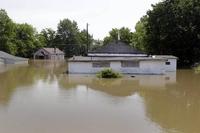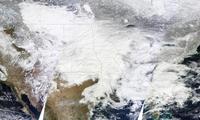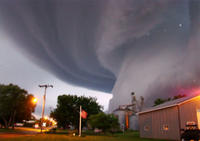-
2011 disasters: $116 billion in insured losses, record economic losses of $370 billion
Figures confirm that 2011 was the second-highest catastrophe loss year ever for the insurance industry: 2011 saw the highest economic losses in history, at $370 billion; the insurance industry experienced the second-largest insured losses ever, at $116 billion; 2011 also brought the highest insured earthquake losses, at $49 billion; flooding in Thailand resulted in the highest insured losses ever for a single flood event, at $12 billion
-
-
2011 disasters spur companies to improve data recovery
As a result of the devastating natural disasters last year, businesses around the world have begun to take data recovery far more seriously
-
-
Insurance companies predict increase in premiums

Even after all the flood waters have receded and power has been restored, New Jersey homeowners will still have to suffer the consequences of Hurricane Irene; according to insurance industry representatives and analysts, homeowners and businesses will likely see their insurance premiums increase over the next several years
-
-
2011: costliest ever year for earthquakes, weather-related disasters

A sequence of devastating earthquakes and a large number of weather-related catastrophes made 2011 the costliest year ever in terms of natural catastrophe losses; at about $380 billion, global economic losses were nearly two-thirds higher than in 2005, the previous record year with losses of $ 220 billion
-
-
Earthquake-prone regions are underinsured
New study finds that much of the world is still underinsured against earthquake risk; underinsurance is often due to low risk awareness in earthquake-prone areas; earthquake models should consider secondary-loss factors more comprehensively
-
-
2011 natural disasters cost U.S. insurers more than $32 billion

2011 saw U.S. government set record for disaster declarations; the severity of the disasters set a record as well, with twelve separate billion-dollar weather/climate disasters in 2011, with an aggregate damage total of approximately $52 billion (this number reflects both insured and uninsured losses)
-
-
States over reliant on FEMA aid for small disasters
This year’s unprecedented number of major natural disasters including Hurricane Irene, the record number of tornadoes, and the floods along the entire Mississippi and Missouri rivers strained the Federal Emergency Management’s (FEMA) coffers, but the number of relatively minor disasters that were declared as “major disasters” pushed FEMA resources beyond their limit; some critics say this trend needs to stop
-
-
FEMA chief: agency to recover $1 billion for disaster relief fund
Testifying before the House Homeland Security Subcommittee last week, Federal Emergency Management Agency (FEMA) administrator Craig Fugate said the agency expects to recover about $1 billion from its disaster relief projects this fiscal year
-
-
Australia’s disasters cost insurers $25.6 billion
The series of disasters that struck Australia this year including the Queensland floods, Cyclone Yasi, and the New Zealand earthquake has hit local insurers particularly hard with a combined loss of $25.6 billion
-
-
U.S. intervention hinders disaster recovery, says reinsurance giant
Lloyd’s of London, the largest reinsurer of U.S. risk, said the federal government’s intervention in the insurance market could hinder recovery efforts following natural disasters; “We don’t believe that the U.S. has the balance between industry and government intervention right, you have government intervention in federal and state level, it demonstrates this is not a sustainable way to proceed,” said Lloyds general counsel
-
-
Disaster scams on the rise
In the immediate aftermath of natural disasters, fraudsters have increasingly rushed in to take advantage of the outpouring of charitable donations; speaking on a panel at an international symposium on organized fraud in Australia, the Department of Justice’s deputy chief for strategy and policy in the Fraud Section of the Criminal Division, said scammers had websites for fake charities in place before predicted disasters had even hit
-
-
Republicans agree to move quickly on emergency FEMA funds
Top Republican lawmakers say they will move quickly to pass President Obama’s request for emergency aid for victims of recent natural disasters like Hurricane Irene
-
-
2011 disasters cause $55 billion in damages in U.S.
This year’ natural disasters could cost the United States as much as $55 billion; prior to Hurricane Irene, the National Oceanic and Atmospheric Administration’s National Climatic Data Center estimated that the nine major natural disasters to hit the United States earlier this year caused an estimated $35 million in damages
-
-
Insurance to cover little of Irene's damage
Hurricane Irene could be one of the ten costliest disasters in the history of the United States and since much of the damage was caused by flooding, insurance will cover little; in previous storms, insurance companies usually cover about half the total losses, but according to the Kinetic Analysis Corporation, insurers will likely cover less than 40 percent of costs
-
-
Hurricane's damage estimated at $7 billion

One private estimate put damage along the coast at $7 billion, far from any record for a natural disaster; most attention was paid to the shore during Irene’s slow ride up the East Coast, but it was inland — even hundreds of miles inland — that the storm’s most serious devastation actually occurred and most of the damage was done by water, not wind; the death toll climbed to thirty-five people in ten states after a number of bodies were pulled from the floodwaters in the Northeast
-
- All
- Regional
- Water
- Biometrics
- Borders/Immig
- Business
- Cybersecurity
- Detection
- Disasters
- Government
- Infrastructure
- International
- Public health
- Public Safety
- Communication interoperabillity
- Emergency services
- Emergency medical services
- Fire
- First response
- IEDs
- Law Enforcement
- Law Enforcement Technology
- Military technology
- Nonlethal weapons
- Nuclear weapons
- Personal protection equipment
- Police
- Notification /alert systems
- Situational awareness
- Weapons systems
- Sci-Tech
- Sector Reports
- Surveillance
- Transportation
Advertising & Marketing: advertise@newswirepubs.com
Editorial: editor@newswirepubs.com
General: info@newswirepubs.com
2010-2011 © News Wire Publications, LLC News Wire Publications, LLC
220 Old Country Road | Suite 200 | Mineola | New York | 11501
Permissions and Policies
Editorial: editor@newswirepubs.com
General: info@newswirepubs.com
2010-2011 © News Wire Publications, LLC News Wire Publications, LLC
220 Old Country Road | Suite 200 | Mineola | New York | 11501
Permissions and Policies
